
A battery cabinet, also known as a battery storage system, is a container that stores electrical energy produced from solar panels or other renewable energy sources. It consists of batteries, an inverter, and other necessary components that regulate, convert, and distribute electricity within a household.
Why do you need one for your home? Here are some key reasons:
- Energy Independence: A battery cabinet allows you to generate your own electricity, which makes you less reliant on the grid. With a battery storage system, you can store the excess electricity produced during the day and use it during the night or in case of a power outage. This means you can save money on your monthly energy bills and ensure that you always have power when you need it.
- Environmentally Friendly: By harnessing solar power or other renewable energy sources, you can greatly reduce your carbon footprint. You’ll be making a positive impact on the environment by reducing greenhouse gas emissions.
- Protection from Power Outages: Power outages are unpredictable and can happen at any time. By having a battery cabinet, you can mitigate the impact of a power outage. When there’s a blackout, the system can kick in and provide electricity for various household appliances, such as lights, fans, and refrigerators. This will give you peace of mind during emergencies, and also save you money on the cost of a backup generator.
- Cost Savings: Electricity prices are constantly rising, and having a battery cabinet can help you cut down on your monthly energy bills. By having a battery storage system in place, you can store excess energy when production is high and then use it during high demand times when electricity is more expensive. This will help you save money in the long run.
- Improved Energy Efficiency: Battery cabinets allow homeowners to monitor their energy usage and optimize their electricity consumption. They also help to reduce energy wastage in the home by allowing you to store excess energy that would have otherwise been lost.


